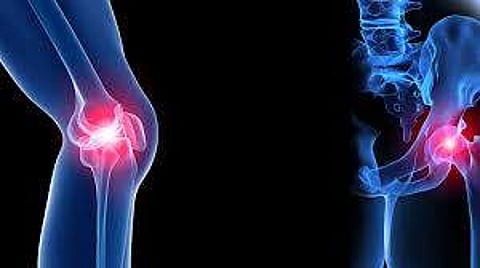

Indian Institute of Technology (IIT) Hyderabad researchers are developing new technologies for bio-compatible implants that will enable early detections of malfunctions through non-invasive monitoring and diagnosis.
Early detection of premature failure or malfunctioning prosthetic implants without surgery can help patients avoid reverse surgery, a remedial measure more expensive and painful than first-time surgery. A huge number of knee, hip and other bone replacements are conducted in India and across the world every year.
The replacements are done mostly on patients aged above 60 years. While the expected durability of the implant is up to 20 years, early failure is observed and sometimes, even immediate failure of an implant is also noticed. This happens due to the lower hardness of the implant and its reaction with the body fluid and organs.
The common solution to detect the premature failure of the implant is reverse surgery, which is more expensive and painful than first-time surgery. IIT Hyderabad Researchers are working towards early detection of malfunctioning implant without surgery, which can solve this problem.
For this purpose, a biocompatible implant with sensing property and high hardness will be the best choice, a statement here said on Monday. The piezoelectric/ferroelectric material can detect the change in mechanical energy due to its dimensional change during the functional period.
To avoid the reverse surgery an eco-friendly and hard ferroelectric material can be an effective choice as an implant instead of other available ceramic or steel- based implants. IIT Hyderabad Researchers have shown that reducing particle sizes of the ferroelectric material results in improvements in mechanical properties without compromising on their electric characteristics, making them suitable for biocompatible implants.
Their work has recently been published in the Journal of American Ceramic Society. The study is being led by Dr Saket Asthana, Head Professor, Advanced Functional Materials Laboratory, Department of Physics, IIT Hyderabad. His team is studying lead-free ferroelectric ceramics for use in orthopaedic implants.
Speaking about the practical applications of his Research, Dr Saket Asthana said, "Most importantly, this eco-friendly material is synthesized by normal solid-state reaction method instead of sophisticated technique, which may reduce the cost of processing of this material. This finding can show the pathway of using this kind of ceramics in prosthetic applications, the piezoelectric property makes them detectable from outside, which enables non-invasive monitoring and diagnosis."
Extensive research in collaboration with the medical team is necessary to come with a real-time and practical application of these materials, he added.
